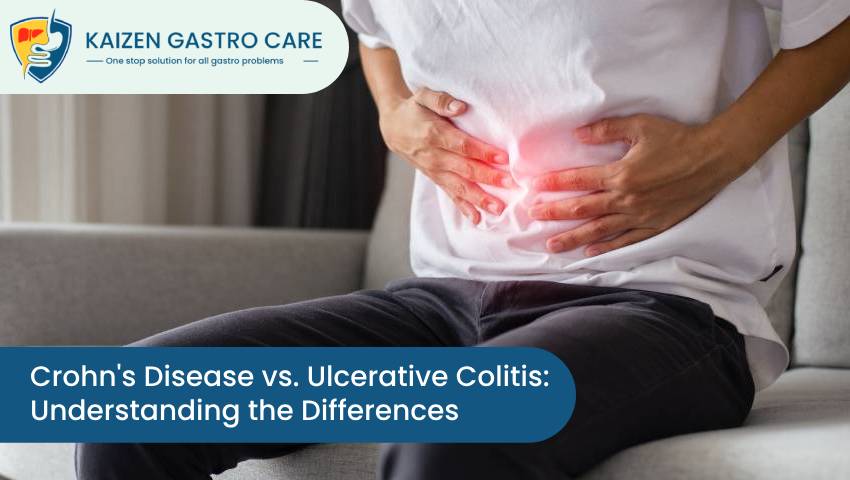
- 18/10/2024
- Kaizen Gastro Care
- 0 Comments
- Digestive Disorder
Crohn’s Disease vs. Ulcerative Colitis: Understanding the Differences
Inflammatory bowel diseases (IBD) encompass two major conditions: Crohn’s disease and Ulcerative Colitis (UC). While both affect chronic inflammation of the gastrointestinal (GI) tract, they differ significantly in terms of affected areas, signs, and treatment approaches. Understanding the differences between these two conditions is vital for proper diagnosis and management. Let’s dive into the key differences.
Dr. Vikrant Kale is a highly experienced gastroenterologist & IBD Specialist in Pune at Kaizen Gastro Care Clinic, specializing in treating IBD, including Crohn’s disease and Ulcerative Colitis. With a patient-centric approach, he aims to provide comprehensive care to those living with chronic gastrointestinal conditions.
What is Crohn's Disease?
Crohn’s disease can affect any part of the digestive tract, from the mouth to the anus. However, it most commonly affects the small intestine and the beginning of the colon. The inflammation in Crohn’s is often patchy, with healthy sections of the intestine interspersed between inflamed areas. Moreover, Crohn’s affects the entire thickness of the bowel wall, which can lead to difficulties like strictures, fistulas, and abscesses.
What is Ulcerative Colitis?
Ulcerative colitis is limited to the colon (large intestine) and the rectum. The inflammation is ongoing, starting from the rectum and extending upwards in a uniform manner. UC affects only the innermost lining of the colon, causing ulcers and inflammation on the surface. It typically results in signs like bloody diarrhea, abdominal cramps, and urgency to have bowel movements.
Key Differences Between Crohn's Disease & Ulcerative Colitis:
Location of Inflammation:
- Crohn’s Disease: Can affect any part of the GI tract from mouth to anus.
- Ulcerative Colitis: Limited to the colon and rectum.
Pattern of Inflammation:
- Crohn’s Disease: Inflammation can be patchy, with healthy sections between diseased parts.
- Ulcerative Colitis: Continuous inflammation, starting from the rectum and spreading upwards.
Depth of Inflammation:
- Crohn’s Disease: This affects the entire thickness of the bowel wall, leading to more complications.
- Ulcerative Colitis: Affects only the innermost lining of the colon.
Symptoms:
- Crohn’s Disease: Includes abdominal pain, diarrhea, weight loss, fatigue, and sometimes, fever.
- Ulcerative Colitis: Common signs include bloody diarrhea, abdominal pain, and urgency to pass stool.
Complications:
- Crohn’s Disease: This can lead to fistulas, strictures, and malnutrition due to its ability to affect the entire bowel wall and multiple areas.
- Ulcerative Colitis: Increased risk of colon cancer and complications primarily related to inflammation and ulcers in the colon.
Surgical Treatment:
- Crohn’s Disease: Surgery is often required to address complications but is not curative.
- Ulcerative Colitis: Surgery (removal of the colon) can be curative.
Diagnosis:
Proper diagnosis is crucial for managing both conditions effectively. Diagnosis involves:
- Colonoscopy: To visualize inflammation and take biopsies.
- Imaging Tests: Such as CT or MRI to assess the extent and location of inflammation.
- Blood and Stool Tests: To check for inflammation markers and rule out infections.
However, the location and pattern of inflammation found during these tests help distinguish between the two conditions.
Treatment Options:
While both conditions require lifelong management, the treatment methods differ slightly:
- Medication: Anti-inflammatory drugs, immune system suppressors, and biologics are used to control both conditions. However, specific medications may be preferred based on the location and severity of the disease.
- Diet and Lifestyle: Maintaining a balanced, low-residue diet and avoiding trigger foods can help control symptoms of both diseases. Crohn’s patients may need more dietary adjustments due to malabsorption.
- Surgery: Surgery is more common in Crohn’s disease, specifically for complications like strictures and fistulas. In ulcerative colitis, removing the colon (colectomy) can be a curative option if medication fails.
Crohn's Disease vs. Ulcerative Colitis: Why the Differences Matter?
Understanding the differences between these two conditions is crucial for choosing the right treatment and managing long-term health. While both Crohn’s disease and ulcerative colitis are lifelong conditions, they require tailored treatment strategies to achieve remission and maintain a good quality of life.
If you are experiencing symptoms or have been diagnosed with Crohn’s disease or ulcerative colitis, it is necessary to consult a gastroenterologist who specializes in IBD. At Kaizen Gastro Care Clinic, Dr. Vikrant Kale and his team are committed to providing personalized care and the latest treatment options to help you manage your condition effectively.
Schedule a consultation today with Dr. Vikrant Kale at Kaizen Gastro Care Clinic to discuss your symptoms and treatment options.
